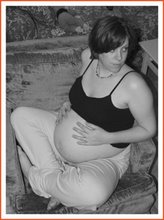Thanks to Dani at mom2mom for sharing this.
.
Last week, Ontario’s deputy chief coroner James Cairns released a widely-publicized report which strongly recommended that parents not sleep in the same bed with their infant children. “We are opposed to co-sleeping, period,” said Cairns.
"The only safe sleeping environment is in a properly manufactured crib with a proper mattress and nothing in it."
Cairns is much too quick to condemn co-sleeping, a normal nurturing tradition that is practiced by the majority of mothers around the globe and has been proven to be beneficial for infants.
The coroner based his conclusions on only 11 infant deaths in 2005 which were attributed to sharing a bed with a parent or sibling. However, at least six of these deaths involved parents who were intoxicated by alcohol or marijuana. Given that over half the deaths attributed to co-sleeping involved other dangerous factors, a wholesale condemnation of bed-sharing is hardly justified. Instead, the coroner should have outlined safe co-sleeping practices, which include never bed-sharing if a parent’s ability to be roused by the infant’s cues is impaired by intoxication, medication, or extreme fatigue.
The coroner’s report is a disservice to Ontario’s families. The importance of co-sleeping is well-documented and substantial. Significantly, during the first few days after birth, co-sleeping allows for immediate breastfeeding and skin-to-skin contact between mother and baby, which helps to regulate an infant’s heart beat, sleep patterns, and body temperature.
Despite popular myths about the repercussions on children of sharing a bed with parents, studies indicate that infants who co-sleep grow up to have higher self-esteem and less guilt and anxiety. Sleeping next to an infant allows a mother to respond better to her baby’s cues. Research has shown that this increased responsiveness can reduce incidences of Sudden Infant Death Syndrome (SIDS).[1]
Co-sleeping also facilitates breastfeeding. Many mothers have reported deriving great pleasure and comfort from being able to wake up during the night when their nearby baby wants to suckle, and then falling asleep together once the child is full. Co-sleeping allows infants to breastfeed whenever they need to, usually 2-3 times a night.[2]
That’s more often than crib-sleeping babies, who may not get to feed when they need to.
Aside from providing an infant with optimal nutrition, breastfeeding has been shown to reduce the incidence of SIDS. Breastfed infants are much less likely to die from SIDS than are bottle-fed infants.[3]
Co-sleeping is part of the normal mother baby relationship and can be done safely. Parents should be made aware of the proper precautions they need to take when sharing a bed with their infant. But outright condemnation of the practice is simply not responsible, especially when it is known that bed-sharing can confer many important benefits to mother and child.


No comments:
Post a Comment